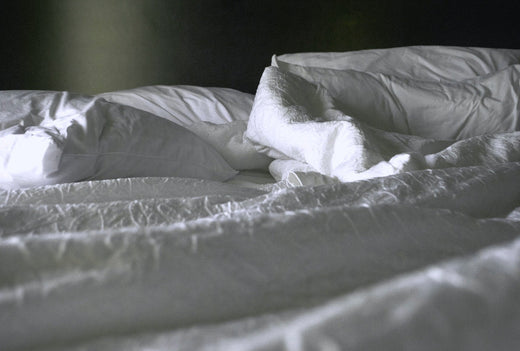
What Does Oeko-Tex Stand For?
|
|
Time to read 4 min
|
|
Time to read 4 min
You have probably seen a little white hangtag with a simple logo on your sheets or a shirt or towel before. That could very well be its Oeko-Tex certification. Shopping with Linenly, all products are Oeko-Tex certified. But what does oeko-tex stand for? What does oeko tex certified mean?
Simply put, oeko tex certification is a guarantee from a third-party organisation that the product the label is attached to was tested for chemicals that are harmful to humans and our larger ecosystem. Oeko-Tex doesn’t actually manufacture any textiles or products itself; instead, it acts as a body to regulate and verify other companies’ textile-based products.
Table of content
Oeko-Tex began in 1992 with the goal of delivering informative facts to consumers about the products they are buying and increasing production transparency from the manufacturers.
Having a third-party certification system is incredibly important in preventing brands from making false environmental claims about their products. As “green” production becomes trendier, this is becoming more common. Independent bodies like Oeko-Tex verify companies for the consumer’s benefit by putting the companies through a rigorous set of environmental production standards. Oeko-Tex certifies a vast number of textiles and tests for a long list of chemicals. For more details on the differences between certifications, you can read our article on organic vs. OEKO certified.
The significance of Oeko tex certification covers a wide range of criteria. When you see Oeko-Tex certified, it is guaranteed that the product is free from all their legally forbidden chemicals. It also ensures that any colourants or other additives that are banned by local and global authorities are not present during the production of the fabric. Oeko-Tex also checks for chemicals that, whilst legally are not an issue, are still harmful to you or the environment, and consequently, banned by Oeko-Tex. Any substances that are remotely detrimental to the environment are not allowed to be used in a product aiming to be Oeko-Tex certified.
One of the most important features of Oeko-Tex certification is that instead of considering just the individual sustainability aspects, the certification expands to include a complete assessment of all the production conditions, like employee health and safety and management of chemicals.
Oeko-Tex has a formidable reputation in the industry, not only for its strict examinations to achieve certification but also for conducting regular audits within these companies to ensure this high environmental standard is maintained and nothing unsafe is added after certification.
Standard 100 by Oeko-Tex is perhaps the world’s best-known label when it comes to environmental standards. Our Linenly bamboo bedsheets carry the classic STANDARD 100 label, so you can be confident that every single component of the sheet, every thread and button, has been tested for any harmful substances and is thus entirely harmless for human health. Criteria for this oeko tex certification standard is updated yearly to expand as new knowledge about products comes to light. This ensures that the STANDARD 100 label remains relevant and trustworthy, providing consumers with peace of mind when purchasing products.
Oeko-Tex is an independent organization based in Europe that sets strict guidelines for textile production to ensure environmental sustainability and human health. Their Standard 100 certification is recognized worldwide as a leading standard for safe and sustainable textiles. The criteria for this certification are constantly updated to keep up with new information and research on textile production. If you're curious about the best quality sheets, you can explore our guide on what are the best quality sheets.
The criteria for this certification are constantly updated to keep up with new information and research on textile production.
Why does knowing if a product has Oeko-Tex certification matter? It is not just the matter of knowing what the certification means, but also knowing what does Oeko-Tex stand for at an ethical level that makes it so important.
Oeko-Tex certification is a reliable and conscientious way of ensuring the product is beneficial to the environment and our bodies. For anyone looking to develop a sustainable, textile-based business, showing you care for the environment and your customers, utilising products with this certification is an excellent way of doing so. Oeko-Tex’s commitment to supporting the production of non-toxic and eco-friendly consumer products is leading to their various certifications and labelling systems making their way onto far more accessible products. For those of us wondering how to apply for Oeko Tex certificate, fear not, it’s not something that you, the consumer, have to apply for; it’s a process undertaken by the manufacturers for the consumer's peace of mind.
So what does Oeko-Tex certified mean for Linenly products? Well, it means Linenly’s luxurious bamboo sheets are guaranteed to be produced with solely organic and environmentally friendly bamboo fibres. Completely certified by Standard 100 by Oeko-Tex, you’ll feel not only good sleeping in them but also feel good knowing you are helping eliminate the use of harmful chemicals in production.
Our sheets are ethically produced and fully biodegradable. Now has never been a better time to switch over from your old ben linen that you aren’t sure of how it was made, to a more sustainable and ethically produced option. Linenly boasts a massive selection of silky bamboo bed linen that will give you the best night’s sleep. Shop our range now and enjoy the comfort of environmentally friendly bamboo bed linen. To learn more about the environmental benefits of bamboo sheets, check out our article on are bamboo sheets as environmentally friendly as they claim to be.

